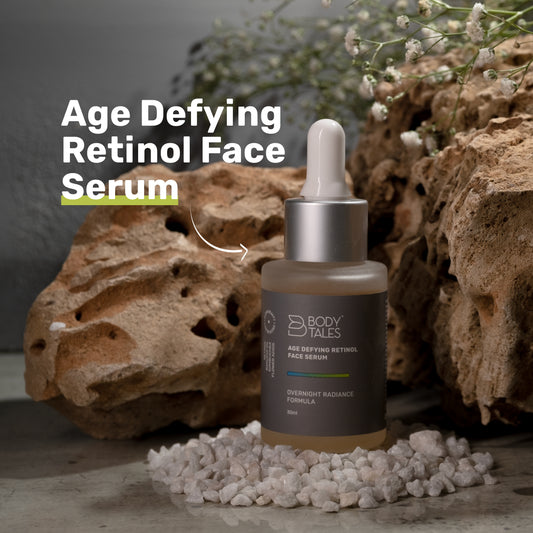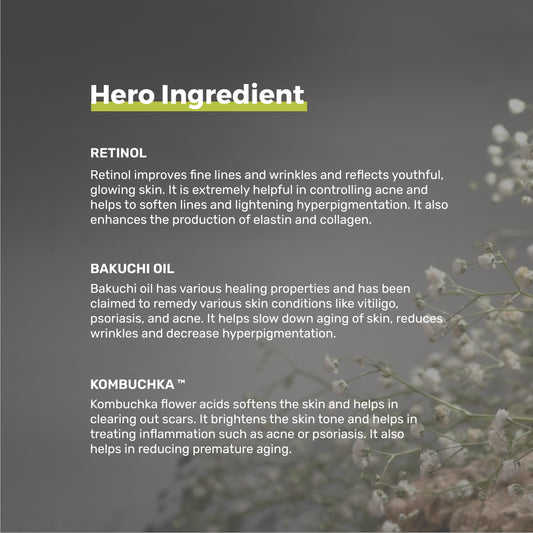Benefits and Precaution of Retinol Serum
What Is Retinol? Retinol Serum Benefits And Side Effects
Retinol Serum is the newest member of the skincare superheroes, along with Vitamin C and hyaluronic acid. Skincare specialists are vouching for this super-powerful ingredient that is supposed to overturn time – we mean to reverse the signs of aging, iron-out wrinkles, and reduce pigmentation.
- What exactly is retinol?
- What Does Science Say about Retinols? – Is it worth the hype?
- Is there any difference between retinol and retinoid?
- How does Retinol serum work?
- What are the main benefits of Retinol serum?
- What are the precautions and side effects of Retinol serum?

What is Retinol?
A Vitamin A derivative helps collagen production, cell regeneration, and cell turnover. It belongs to the fat-soluble vitamin group commonly found in carrots, sweet potatoes, and eggs.
Retinol offers a slew of benefits to users. It helps smoothen out wrinkles and fine lines, prevents the new ones from forming, enhances skin’s natural glow, works best for treating acne by regulating water-oil production, and minimizes dark spots and scars. Sounds too good to be true? It might just be the truth. So let’s check what science has to say about retinol.

What Does Science Say about Retinols? – Is it worth the hype?
Tretinoin was the first retinoid, in 1971, to be used for the treatment of acne and other skin infections. It was also effective for fading out hyperpigmentation spots and irons out wrinkles.
To know how retinol face serum helps, you should know a little about your skin. Till we hit our 30s, our skin cells will regenerate and create a fresh layer of new, clean and untouched skin every 28 days. So, every month, we get a new layer of unblemished skin.
It is where retinol comes to the rescue. Science says that retinol has properties that allow it to go deep into the epidermal layer and marginally to the dermis layer. As a result, the topical application of retinol boosts cell turnover and improves cell-regrowth factors.

Is there any difference between retinol and retinoid?
Retinols and retinoids aren’t the same, nor are they completely different. Both are synthetic chemical derivatives of Vitamin A, and both help boost collagen production and cell-regeneration and treat acne.

What are the main benefits of Retinol serum?
1. Retinol serums help reverse signs of aging
Retinol serums also stimulate the production of collagen fibers which help enhance skin’s elasticity and firmness. By enhancing cellular turnover and elastic production, retinol serum for face is undoubtedly the best anti-aging solution out there.
2. Retinol is a highly valued treatment for acne
3. Retinol helps even out pigmented skin
Retinol serums are highly celebrated potions among dermatologists as they help tackle hyperpigmented skin and dark spots. This serum helps in reducing skin discoloration, enhances even distribution of melanin, and reduces skin pigmentation by nearly 60%.
4. Retinol serum Neutralizes free radicals
5. Retinol Serums are one of the best exfoliants out there
What are the precautions and side effects of Retinol serum?
Sometimes, retinol, a highly potent ingredient, can damage your skin, especially if you are using it for the first time or incorporated too quickly into your skincare regime.
Start by using the serum once a week, gradually work it a couple of times a week, etc. Moreover, using it with other hydrating serums such as Bodytales Hyaluronic Acid Serum helps mitigate the harsh effects of retinol quickly.
Remember that retinol interacts with the sun, and any exposure increases irritation and skin sensitivity. So always make sure to use sunscreen to protect yourself when using retinol serums – even in winters.
Selecting the right retinol serum is highly important when you want the best results. Although several retinol-based serums are flooding the market, caution must be taken when selecting the one for you. We suggest Bodytales Age-Defying Retinol Serum that works wonders for your skin. Try it, and with time, you can reverse the effects of time on your skin.




